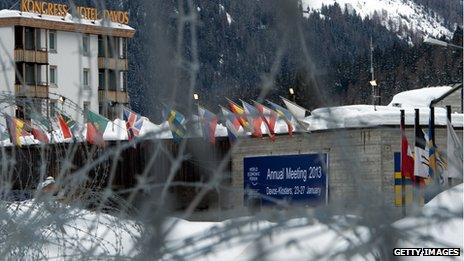Davos 2013: Leaders fail to inspire trust
- Published

Is the distance between the leaders and the outside world symptomatic of mutual distrust?
Security guards on the roofs of some of Davos's tallest buildings are keeping a close eye on the crowds below.
Presidents, prime ministers and other government officials are gathering for five days of discussions with captains of industry, bank bosses and heads of non-governmental organisations.
So the streets of this Swiss ski resort have been effectively cordoned off by a series of roadblocks and there is airport-style security checks all over the place.
To many, perhaps most, this is understandable. Many of the leaders here have dangerous enemies.
But the way this rarefied gathering of global leaders has decided to create large gaps between themselves and the outside world is also symbolic, perhaps even symptomatic, of deep distrust.
And it is not just the powerful that are suspicious.
As the annual meeting of the World Economic Forum (WEF) gets underway, the world outside has delivered a harsh message back.
The feeling is mutual, they say. In general, ordinary people do not trust their leaders either.
According to the 2013 Edelman Trust Barometer, external, the world's leaders are less trusted than they were a year ago.
"It is a natural result of people's disappointment during a year of many scandals," says Edelman's chief executive, Richard Edelman, in an interview with BBC News, pointing to well-publicised scandals linked to the disgraced cyclist Lance Armstrong, the banker Bob Diamond and the failures within the management culture at the BBC.
"There have been a lot of failures by big people," he says.
Deserved credibility
Inside the WEF congress centre, the world famous conductor Vladimir Spivakov is showing the politicians and chief executives a thing or two about how to be in charge.
Mr Spivakov sets the tone. He decides the pace and the rhythm, and it is he who creates the spark, as he leads the Moscow Virtuosi Chamber Orchestra from the front, cantering through works by Puccini and Rossini, by Boccherini, by Tschaikovsky, and by Rachmaninoff.
.jpg)
Security are taking no chances at this year's gathering of global leaders in Davos
The orchestra's trust in him is absolute, and so the musicians let themselves be led, only too ready to deliver.
In truth, many a global leader today likes the idea of being the conductor, or perhaps the lone and fearless captain at the helm.
But what might work in concert halls or aboard ships might not work within companies or government, according to Mr Edelman.
Leaders can no longer rely on getting credibility solely because of their positions or their titles, he says.
"In fact, you could argue the opposite," he reasons, "that chief executives are constrained by their position - that it constrains their ability to tell the truth".
Telling the truth?
That seems to be the view of many ordinary people questioned by Edelman.
More than four in five of the general public would expect a business leader to lie when confronted with a difficult issue, according to the PR firm's trust barometer.
Government officials fared even worse in the survey, which resulted from 26,000 20-minute online interviews with ordinary people in 26 countries, as well as 5,800 such interviews with so-called "informed" members of the public.
Only one in six of the respondents would expect government officials to tell the truth when facing tough issues, it found.
'Not great trust'
The lack of trust in leaders - whether voted in through general elections or by companies' supervisory boards - appears to contrast sharply with the way the public's trust in NGOs, in business and even the media has increased during the last year, according to the barometer.
In other words, people have a beef with the individuals in charge of institutions, rather than with the institutions themselves.
Hence, governments are generally trusted a lot more than their ministers, the Edelman survey found.
But the contrast is not as sharp as it first seems, Mr Edelman explains, as the trust in the four institutions - governments, companies, the media and non-governmental organisations - might be there, but it is not great trust.
Only 17% of those who trust business and 16% of those who trust government, say they trust them a great deal, Mr Edelman explains.
To rebuild trust, global leaders must redefine their organisations' objectives, Mr Edelman insists.
They must do more to include and involve both staff and other stakeholders in decision making, and they must open up and explain what they do and why they do it that way, he says.
"If people don't understand what you do, they'll assume the worst," he says.
You can follow Jorn's coverage from Davos on Twitter @jornmadslien and @bbcbusiness